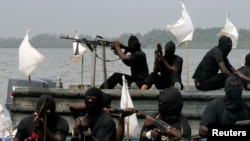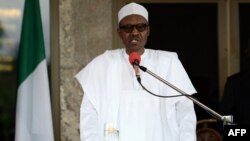At their height earlier this year, attacks by militants in Nigeria's Niger Delta region cut the country's oil production nearly in half. Now, the Nigerian government has opened talks aimed at restoring peace in the oil-producing region.
Community leaders from the Niger Delta took part in a closed-door meeting with President Muhammadu Buhari at the state house in Abuja Tuesday.
The government hopes the talks will help pave the way to peace in the Niger Delta and allow full oil production to resume, a development that would give a big boost to Nigeria's ailing economy.
For decades, youth in the Delta have protested against the government, prompted mainly by widespread poverty and accusations that oil companies have polluted the land.
A new group called the Niger Delta Avengers has claimed responsibility for dozens of attacks on oil pipelines and other infrastructure in the region in the past year.
But the Niger Delta Avengers did not send its spokesperson to today’s meeting. The group remains anonymous.
Early stages
One meeting participant, Udengs Eradiri, who spoke to VOA before before the talks began, said the process is only in its early stages.
"You can see there are issues from the representation. There have been complaints here and there. Today is an inaugural meeting. We have informed everybody that look, let us allow for this process to begin," said Eradiri, who is president of the Ijaw Youth Council, a highly influential community group formed nearly two decades ago to voice the concerns of the Niger Delta people.
The Ijaw Youth Council played a huge role in helping broker the 2009 deal between the government and militants that ended a previous wave of attacks on oil facilities.
But Eradiri had reservations about what could be achieved Tuesday.
"We’re not expecting much out of this meeting. Whatever we’ll be doing today will just be window dressing. We believe Nigeria’s problems need to be solved once and for all and in order to do that, we need to revisit our constitution," Eradiri said.
Demands for local control of wealth
Groups like the Ijaw Youth Council and the Niger Delta Avengers have been demanding more localized control of the wealth generated from the oil pumped out their communities. That would mean changing the structure of Nigeria’s federalism to give more power to the states.
The Nigerian government is hoping to satisfy the demands by bringing much needed development to the Niger Delta.
Last week, President Buhari announced a plan to launch a $10 billion infrastructure investment program in the region.
Idang Alibi, the media adviser to the state oil minister, told VOA he was very optimistic that Tuesday's meeting would be successful. He also said that negotiating peace does not happen in a day.
"Everybody is aware of the importance of oil to Nigeria. The government is very sincere in bringing peace and the meeting is very representative of all the stakeholders in the Niger Delta," Alibi said.





